
It’s been two months since the first case of COVID-19 was confirmed on U.S. soil. In that time, things have escalated rapidly.
Classes have been cancelled, kids are home from school, jobs have been put on pause, businesses are closed, and professional sports shelved. By now, the “new normal” of coronavirus is starting to set in for most of us, but many are left wondering just how scary the new normal might possibly get, and more importantly, what they can do to prepare for it.
Preppers all over the globe have been preparing for something like this for a long time, stockpiling critical supplies and acquiring skills to help them survive in the event of a widespread disaster like the one we’re facing now.
In reality, the ideal time to prepare for the coronavirus has passed. Still, this thing is a long way from over, and if you’re wondering if anything can still be done now, the answer is “yes.”
Important Considerations
Here are a handful of important considerations to keep in mind.
Don’t fear buy. A pandemic can trigger fear, anxiety, and strong emotional responses. But an emotional response can often worsen things. A backyard bunker or a dozen AK-47s won’t make you any more invincible to the virus.
There’s a difference between things that you have already decided to buy, but have been procrastinating, and things you never thought of until you watched a scary video yesterday. Making a rash, big-ticket purchase right now will only make you feel worse later.
Brush up on medical training. This would be a good time to brush up on basic first aid, as well as any protocol for specific conditions or disorders that your family deals with. Remember, hospitals and medical infrastructure are stressed. Even if you never get the coronavirus, they may not be able to deal with other emergencies that arise. Cuts, burns, and other minor emergencies may be best treated at home.
Don’t “bug out.” With a disaster like this, there is little to gain by bugging out to a new location. Unless you have a well-stocked cabin up in the mountains someplace (that has the internet and everything else you might need to live comfortably for a few months), then don’t bother.
Instead, hunker down or “bug in,” in your home. This is where you have the supplies you might need. This is where you are close to medical resources that your insurance will cover. This is where you are near the people whose help you might need. This is where you have running water, toilets, a roof over your head, and a place to sleep. This is where you don’t need special permission or arrangements to stay.
Don’t go stay with family. While the idea of going to stay with some family might feel psychologically relieving, the reality is that the more people you have under one roof, the more people you have to share infection with.
Be smart about acquiring food and supplies. Are there stores in your area that most people wouldn’t think about? Dollar stores have a lot of supplies that could do in a pinch, and are often located in less-populated areas. Other areas have Shopko, Kmart, Big Lots, Roses, Maxway, or others. These stores fall well outside the “upper crust” of retail, but may still have food or supplies that other stores don’t.
Can you shop in off-peak hours to minimize contact with others? What can you purchase online to sidestep the whole thing together?
How (and What) To Prepare
From a prepping perspective, the most important overarching goals with the current coronavirus status are to: Avoid going in public, and limit the amount of contact you have with others. Keep everything (and everyone) as clean and sanitary as possible.
To those ends, here are the most critical preparations that you can still make, during the “11th hour” phase of the game we’re currently in. The short list:
- Accumulate two to four weeks of food and groceries (more if possible) This is the most common sense “prep” of them all, because whether the coronavirus ends up touching your household or not, it’s a foregone conclusion that the food will be eaten (unlike many of the things that some people are saying you should buy). Having two to four weeks of groceries will go a long way to help you limit the number of times you need to go in public. If you are in a position to purchase more food, you can work through a longer-term food storage list or buy prepackaged food supplies.
- Stored water, a water filter, and water jugs with handles: Remember, water is liquid life. Even though right now most people’s water sources haven’t been affected by COVID-19, a number of things could happen to change that. Act now.
- Medicines and basic medical supplies: Regular pain and fever medicines like Tylenol and Acetaminophen, but also your specific prescriptions if possible. Do you have a refill? Can you get one? Other basic medical supplies such as bandages, wound dressing, antiseptics, and a good first aid kit are smart as well.
- N95 masks and nitrile gloves: Fantastic for minimizing direct exposure to people or surfaces that might be infected with the virus. At this stage in the game, you will be lucky to find them, but if you come across a black market or sudden stroke of good fortune, grab them.
- Cash: It’s always good to have cash on hand. Banks are functioning fine right now, but that could change too, and if it does, things will get a lot. Get out some cash while you can.
- Hygiene basics: Soaps, sanitizers, bleach, household cleaners, paper goods, feminine hygiene products, toilet paper, and detergents. Like the Centers for Disease Control has been preaching, keeping things as clean and sterile as possible is the name of the game. Most hygiene basics have already been picked clean from many stores, but you may still be able to find some with a little diligence, or some online scouting.
- Drop cloths: If you do need to quarantine a friend or family member in your home, these can be used to seal off a room.
The Biggest Mistake People Are Making
First, some good news: at this particular juncture, the coronavirus has made very little impact on our critical infrastructure. We still have electricity, water, and functioning sewage systems. There is still gas in the pumps, banks are functioning, roads are intact, and the supply chains (although taxed) are in place.
Because of this, it doesn’t feel like a major disaster a lot of the time. But here’s where things can be deceiving. The biggest mistake that people are making now is the same mistake that unprepared people made with coronavirus in the first place—the assumption that things won’t get any worse.
There’s a chance they won’t. But there’s a very real possibility they will. Here are just a few ways the situation could quickly become much more complicated:
- Many places in the Northern Hemisphere are just beginning to creep out of winter. If a late winter storm should hit, power outages and major supply chain disruptions would almost certainly follow. Just take a look at what Utah experienced earlier this week when a 5.7 earthquake hit.
- For states along the Southern Atlantic and the Caribbean, the beginning of hurricane season is roughly two months away (officially June 1). If we are still dealing with the effects of the virus (let alone if it’s still raging or on the upswing), the combination of a hurricane of any size could be catastrophic.
- The long-term economic implications of the coronavirus could be massively worse than the virus itself. With each passing day that businesses are closed, confidence is shaken, stock prices fall, and layoffs and job losses occur. A pronounced, long-term recession would affect virtually every household in the country, as prices increase, buying power shrinks, and desperation sets in.
Looking Ahead At The Longer Term
Income: One of the most devastating side effects of the coronavirus is its financial impact for many people. If your employment is affected for any length of time, perhaps there’s another way to generate at least some income.
Consider:
- Online freelancing. Hubs like Upwork offer people the opportunity to perform critical services on a freelance basis from anywhere with an internet connection. Jobs are posted in virtually every category—writing, editing, design, legal, computer programming, translation, data entry, and dozens more.
- Teaching, tutoring, consulting. Is there a skill you can teach? Another way to generate some income online could be through teaching virtual lessons, tutoring, or offering consulting services. Sites like Varsity Tutors exist to pair students of all levels with tutors who can help them. Teaching English online is another great option for many people (even with little to no teaching experience).
- Local services or day labor. Are there local services that you can safely provide, without too much social contact? Car repair, construction, agricultural, and general laborer jobs will likely still be available. Check classified sites like Craigslist or Facebook Marketplace.
- Driving Uber (but not during coronavirus). Uber can be a fantastic way to generate additional income. Lots of working professionals have used Uber as a means of generating additional income to get through tough times. It’s not a great idea during the middle of a pandemic, but something to keep in mind down the road.
Prioritizing more emergency supplies: After acquiring a few weeks of emergency food and supplies, continue to build your resources as your space and money permit. Most preppers shoot for one year’s worth of food storage, with a combination of freeze dried “emergency food,” regular items from a grocery store, and super long-term dry and bulk staples (rice, wheat, pasta, etc.).
In addition to food, you can slowly add other valuable pieces of survival gear to be more resilient, such as flashlights, a basic car emergency kit, a generator for the home, or perhaps a chainsaw. Maximize your dollars spent by thinking critically about what scenarios are most likely.
Gather important documents on a thumb drive: One of the least expensive yet most overlooked and most important preps anybody can do is to gather all the critical documents that his life hinges on, and store copies on an encrypted thumb drive.
This is a solid best practice no matter what may come. Having all your critical documents in one place makes it infinitely quicker to access them should you need to. Birth certificates, marriage certificates, medical histories, titles to the home and cars, financial account information, insurance, even diplomas and college transcripts would all belong.
Knowledge and info: One of the biggest “gripes” of the prepper community is that as a people we have become generally more helpless, and dependent on other people to do everything for us. In the 1800s, lots of people built their own houses, grew their own food, delivered their own babies, and more.
While the world has changed quite a bit, and it’s not realistic for us to flip a switch and instantly become some leathery “jack of all trades,” it is possible to slowly reskill ourselves in some areas.
Think about what this looks like for you. Can you learn to perform at least minor repairs on your own car? Can you plant a garden? Even learning how to cook a little more can be a great way to do something for yourself that adds value and decreases your dependence.
Then Onward
While life has been thoroughly disrupted for many of us, there are still things you can do to prepare for, mitigate, and make the best of a bad situation. Furthermore, the coronavirus of today can be the catalyst that prompts many of us to think more critically about tomorrow.
Do what you can now, look ahead to the future, and try to take smart steps before your back is completely against the wall. Finally, after you’ve done what you can, try to breathe deeply and remain as calm as possible. In a nutshell, this is the essence of prepping.









